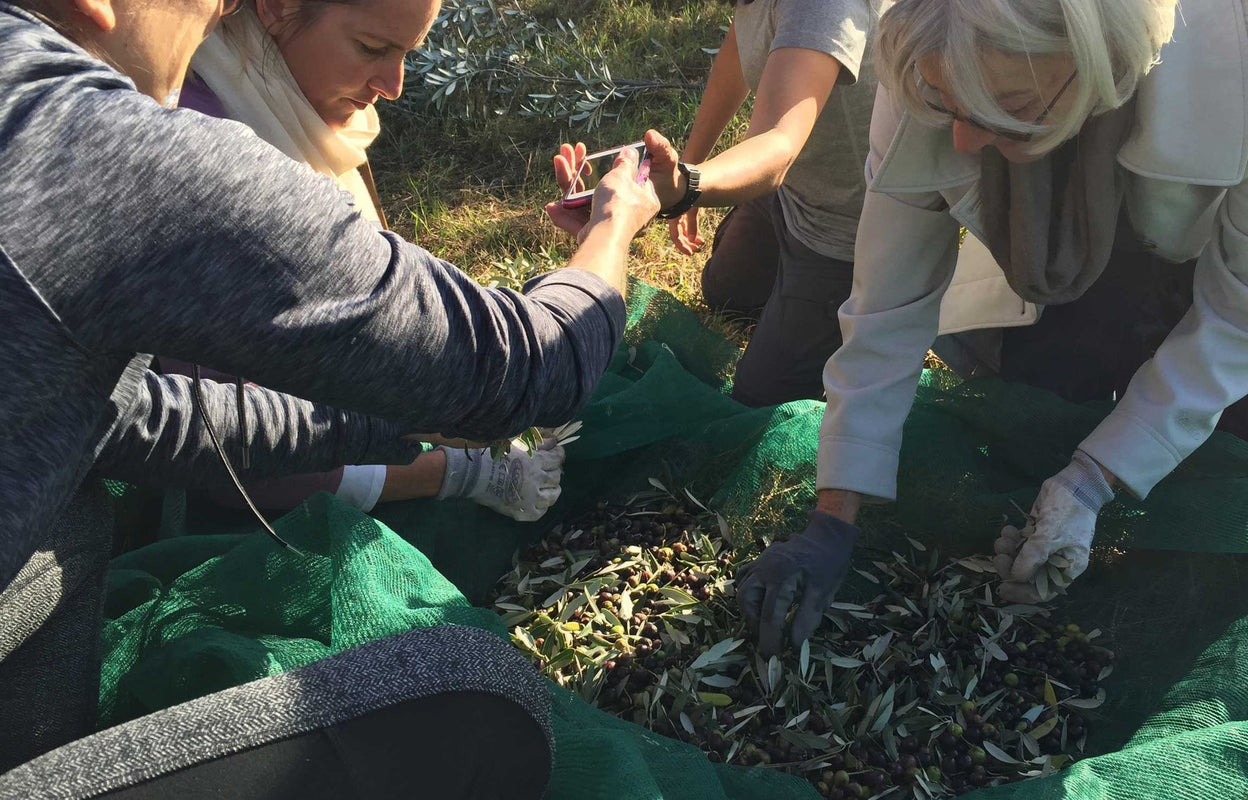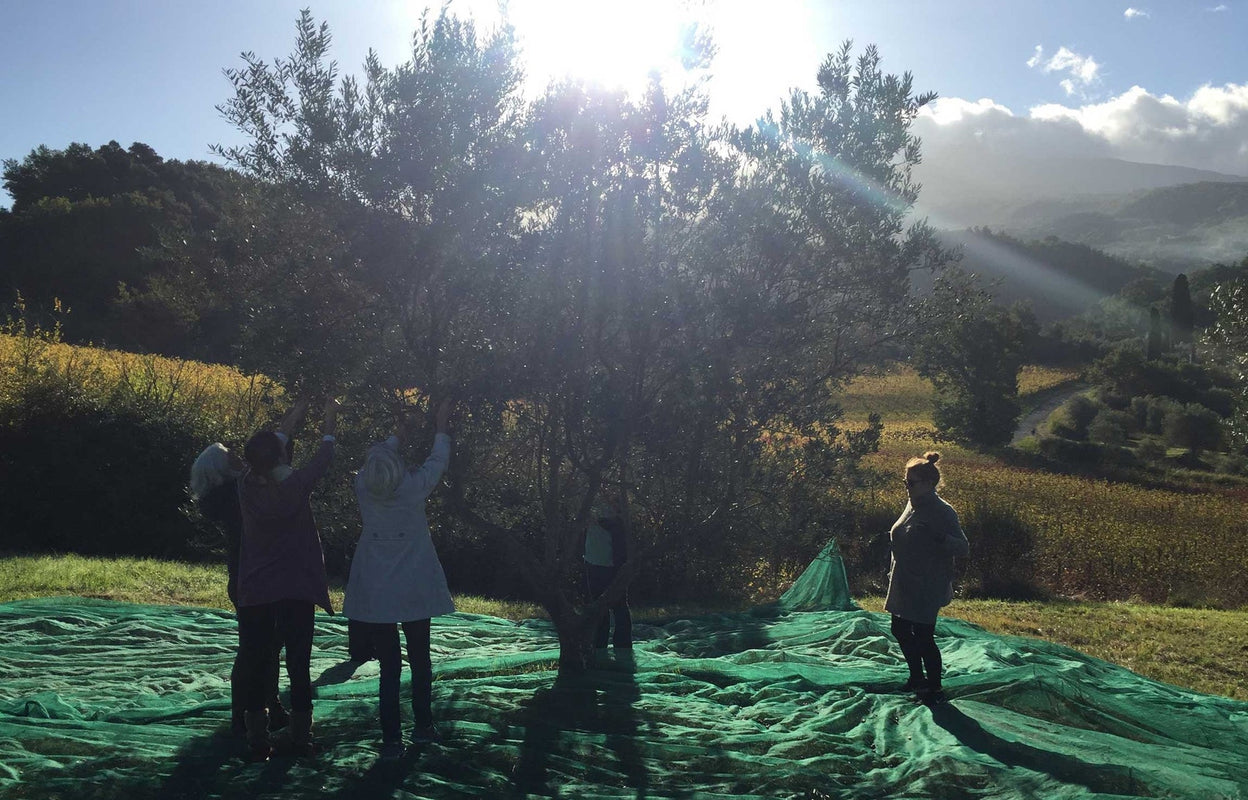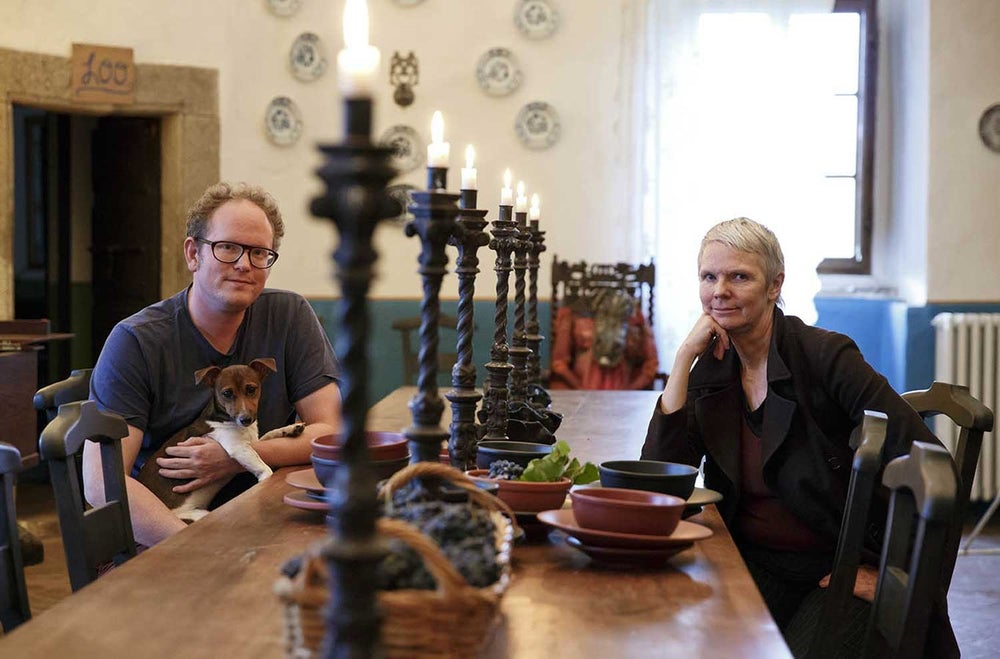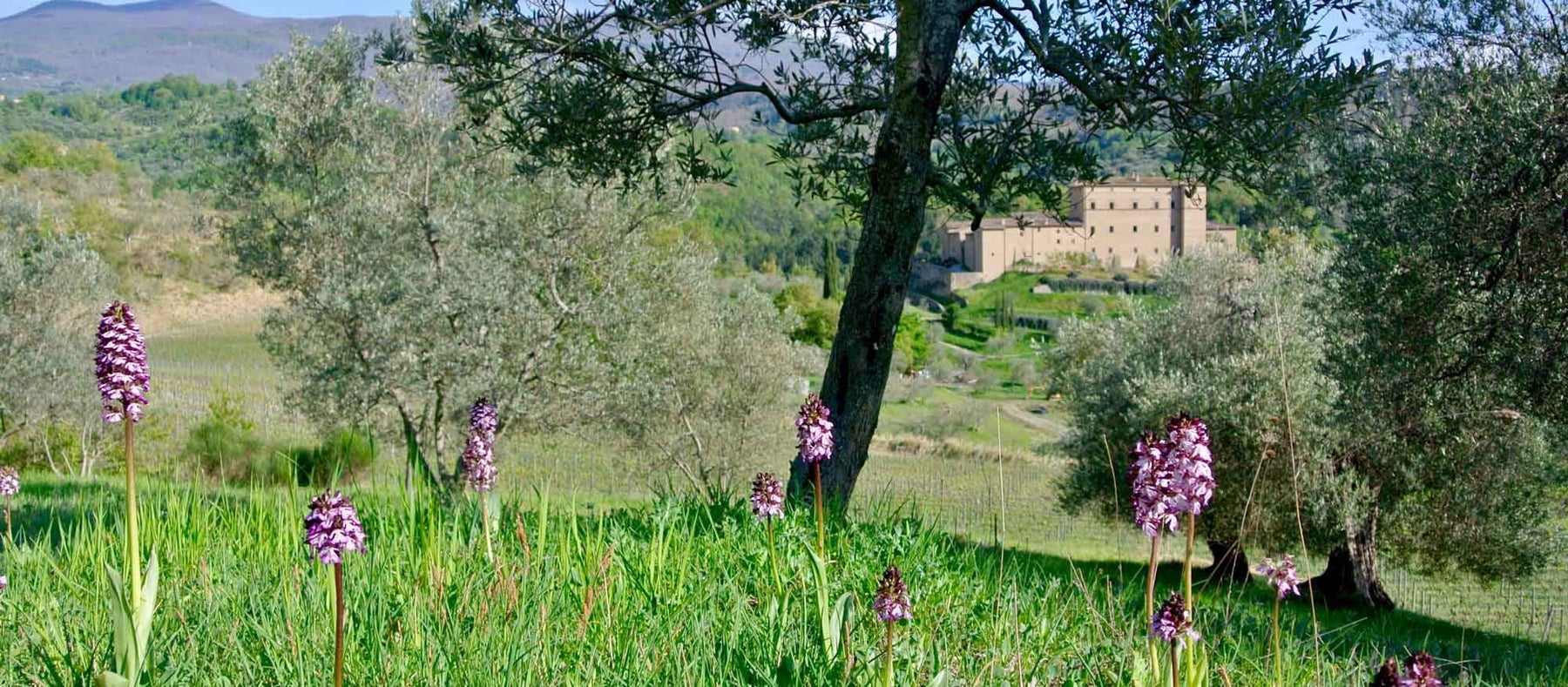

Why Protect the Potentino Valley?
A Unique Microclimate And Geography
Potentino lies in a sheltered valley farmed since Etruscan times. It is home to centuries-old olive trees and some early examples of the Sangiovese grape variety. This continuous tradition of cultivation still carries on now. Industrial farming has not affected the area and the landscape remains similar to when the castle was built. It lies below Monte Amiata, an extinct volcano that last erupted between 180,000 and 300,000 years ago, creating an exceptional terroir with a concentration of volcanic soils.
During the day, the valley is well ventilated by hot dry air drawn off the sea and coastal plains; at night, it is cooled by fresh, cool air coming down from the mountain. Its well-protected bowl-like shape acts like a crucible ensuring that the volcanic matter is gathered and blended. There is an abundant supply of water. It is known locally as ‘La Conca D’Oro’ – The Golden Basin – as it is so fertile.
With this mineral-rich, geologically new terrain and the extreme changes in temperature, Potentino is the ideal location to make fine, elegant wines and delicately flavoured olive oil and probably why the Etruscans settled here. It is a place where many local traditions and practices have survived, indicating a symbiosis based on observation and respect, sensibility and discipline. The valley is an example of good land management, which involves a delicate balance between human intervention and the surrounding micro-life. The soil has not been subjected to repeated use of chemical products so remains healthy unlike so much of the surrounding Tuscan farmland.
There is no monoculture or industrial crop-spraying in the valley, which results in an abundance of flora and fauna, including some rare species of bird, insect and plant life. A wide range of native varieties, including apple, pear, cherry, and quince grow alongside olive groves of the indigenous Olivastra Seggianese variety. Wild flowers and orchids fill the fields in early summer. These are all elements that create a healthy and vigorous ecosystem – extremely rare in this day and age. This is why we at the Potentino Valley Project (PVP) believe it should be saved.


Volunteering is at the heart of restoring the Potentino Valley
The Potentino Valley Project And Community Supported Agriculture
The creation of the PVP is a means of gathering support and creating a wider community to regenerate agricultural traditions around the Amiata. The idea grew out of movements across the globe responding to the expansion of the environmentally damaging industrialisation of agriculture: Agricultura Civica in Italy, Takai in Japan and Community Supported Agriculture (CSAs) all over the world.
The growth of CSAs in the last few decades reflects people’s desire to support small farmers and producers who are not only committed to land stewardship but can also provide for their local communities. Along with movements like SlowFood and farm-to-table projects like Dan Barber’s Blue Hill Farm, they are a practical solution to concerns about GM produce and industrialisation of food production, helping to increase environmental awareness and foster a greater mindfulness about where our food comes from.
These programs help sustain a more stable network of growers and producers for the future. The Potentino Valley Project is a mechanism for actively preserving the valley while providing people with Potentino Valley products – all of which have been made with a sensitivity to the surrounding ecosystem and its history.


Our Goal – to create a biodiversity ‘fortress’ for the future
The Potentino Valley Project (PVP) is designed to support the environment surrounding Castello di Potentino through conservation and agriculture. Land husbandry has been a part of Monte Amiata since Etruscan times. However, diminishing numbers of people are implementing these agricultural traditions – much of the fertile zone is being abandoned. Miraculously, the Valley has been sheltered from the impact of modern farming and the intensive use of chemicals. It continues to host extensive biodiversity and the landscape has not been significantly altered since medieval times. This is an exceptional situation in modern-day Tuscany.
Potentino has been pumping up the strength of this ecology by planting fruit trees and a sacred ‘bosco’ or wood which has a rare selection of indigenous trees. We are also increasing the bee presence with over 40 hives. A whole series of bat boxes have been placed along the valley and in the olive groves. We have been grazing sheep and geese in the fields. We are also studying the flora and fauna of the valley in order to document the presence of rare examples which will be published in a book as a guide to the valley and will create walks in the area focusing on interesting historical or natural features.
The PVP intends to preserve this unique place and the vestiges of its ancient heritage by making its produce and way of life more accessible and appreciable to a wider range of people. Education is a central PVP goal. Castello di Potentino has worked with young people through WWOOF (World Wide Opportunities On Organic Farms) for over 15 years, and will continue to give volunteers a chance to learn about farming through first-hand experience. About 5,000 volunteers in total have come to experience the magic of Potentino and continue to maintain a strong connection with the Valley to this day.


Be A Part Of The Project
By becoming a PVP member you will be helping to maintain traditions for future generations – traditions that have played an essential role in forming a habitat that has continuously nurtured human populations since pre-Etruscan times. Members will become part of a unique community that is connected by a sense of place, where the relationships between the climate, the earth, the vegetation, individual sensibility and the past come together in the enjoyment of local food and wine, castle life, and the actual earth where the produce comes from. We believe that all culture grows from a relationship with place. Place creates idiosyncratic cultural expressions – from agriculture and viticulture to art, music and design. In other words, it creates living.
Castello di Potentino is focused on establishing cultivation of fruits and vegetables that are appropriate for its particular environment – including some Amiata ‘heirloom’ varieties. Planting more trees and encouraging microlife.
When plots of land become available in the valley, we will use the proceeds from the PVP membership to acquire and revive them. This will ensure that this valuable ancient landscape becomes less vulnerable to construction.
The project also aims to regenerate interest and employment within the local community by setting up a viable model for economic and cultural sustainability. Using knowledge and resources around the Amiata, the PVP will support local craftsmanship so that it remains an important part of the social structure.
Other projects we are initiating include reintroducing the transumanza – the traditional migration of sheep from pasture to pasture bringing the flocks from the lowlands up to the mountains so that they could continue to graze. At Potentino we plan to bring in a flock of sheep to produce milk for cheese from the otherwise unused grass. Adopting a lamb or even adopting a bee hive with its colony will be an option for members. The articles from weaving and making felt from the wool from the flock that grazes on our pastures can also purchased in order to support our endeavours.
The PVP will also explore alternative energy sources for use in rural situations.




